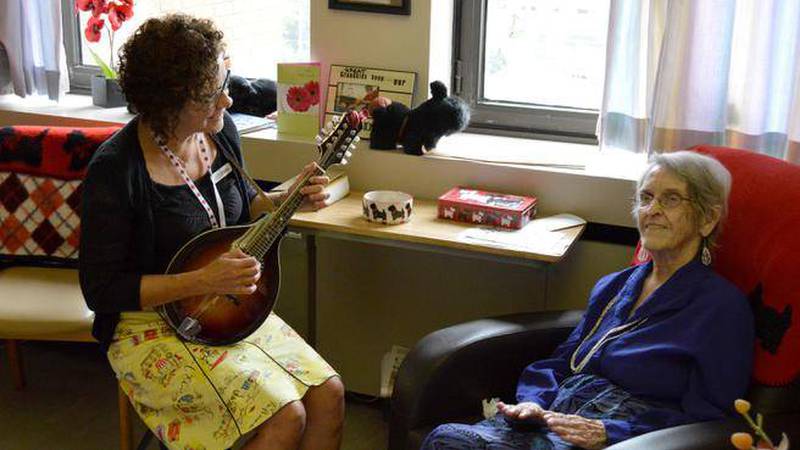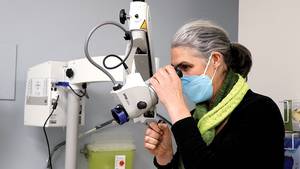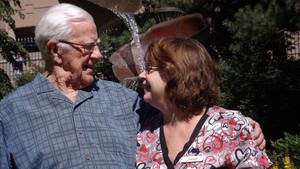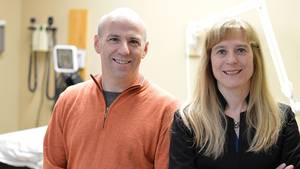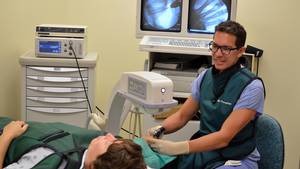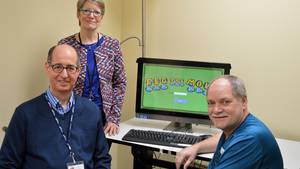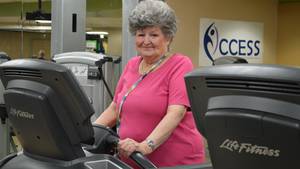Music has the power to move us at every stage of life. Erin Montgomery uses music to connect with terminally ill patients. It helps to alleviate their pain, reduce their stress and facilitate meaningful experiences for their families in the final days of their lives.
Erin is one of three music therapists working with patients and veterans at the QEII Health Sciences Centre. Providing one of many services offered through the QEII’s Rehabilitation and Supportive Care Services, Erin and the other accredited music therapists work as part of a healthcare team, using music to help meet the physical, emotional, cognitive, and social needs of patients.
“Music is really powerful,” says Erin, who works on the 13-bed palliative care unit at the QEII’s VG site. “Probably 50 per cent of the time, the first strum of the guitar brings tears to the patient or their family members.”
The majority of patients referred to Erin are experiencing pain, anxiety surrounding their impending death, loss of independence, or low mood.
“We have data to show that even one session with a music therapist helps,” says Erin, who has worked at the QEII since 2003.
During an initial meeting with a patient, Erin explains what music therapists do and, as part of her informed consent procedure, cautions music can bring up difficult emotions, especially for dying patients. Music, she explains, is a form of sensory stimulation, which provokes responses due to the familiarity, predictability, and feelings of security associated with it.
A talented musician, Erin sings and plays her guitar or keyboard for patients. Often family members are present during a therapy session, which can last up to one hour and often take place up to three times a week.
“In this setting, where fatigue is a primary concern, it’s very much about singing to patients,” she says. “As much as possible it is patients and their families telling me what music is important to them.”
Through her work, Erin has watched a tear roll down the face of a patient, who had previously been unresponsive, when she played their favourite song; helped a dying woman choose the music she wanted played when her ashes were scattered; and learned the words and melody of a favourite song to sing in an intimate moment while someone lay dying.
If a patient is experiencing physical pain, music can help them release the tension in their body.
“Music can override the pain stimulus in the brain,” she says.
Research shows that music therapy is linked to a reduction in pain medication, a decrease in disruptive behaviours, an increased quality of life and speed in recovering from surgery. Music therapy research also proves its effectiveness in countless areas such as overall physical rehabilitation, increased motivation and engagement with treatment, emotional support for patients and their families, and providing an outlet for expressing feelings.
At the QEII’s Camp Hill Veterans Memorial Building, music therapist Johanne Gallant works with veterans, the majority of whom are over the age of 90 and have dementia. She uses similar clinical goals when working one-on-one with patients. In addition she runs group sessions, where she has people singing popular songs like “You Are My Sunshine” and “Home on the Range.” In the evenings when residents often feel restless, relaxation music therapy groups help residents feel more settled leading to a better night’s sleep.
“Even people who are no longer able to converse, can often sing,” says Johanne.
Nurses at the QEII report a reduction in disruptive behaviours such as calling out and wandering among patients with dementia as a result of music therapy, says Johanne.
On the sixth floor of the QEII’s Veterans Memorial Building, Johanne often plays her mandolin for individual veterans as they sit around the nursing station, where both residents and staff tend to gather. The positive impact of music therapy spills out into the general environment and everyone within earshot benefits.
“The music often brings a smile where there has been a neutral expression,” she says. “Music is therapeutic for many people. We’re not entertainment. We’re focused on the individual, using music to meet specific clinical goals.”

